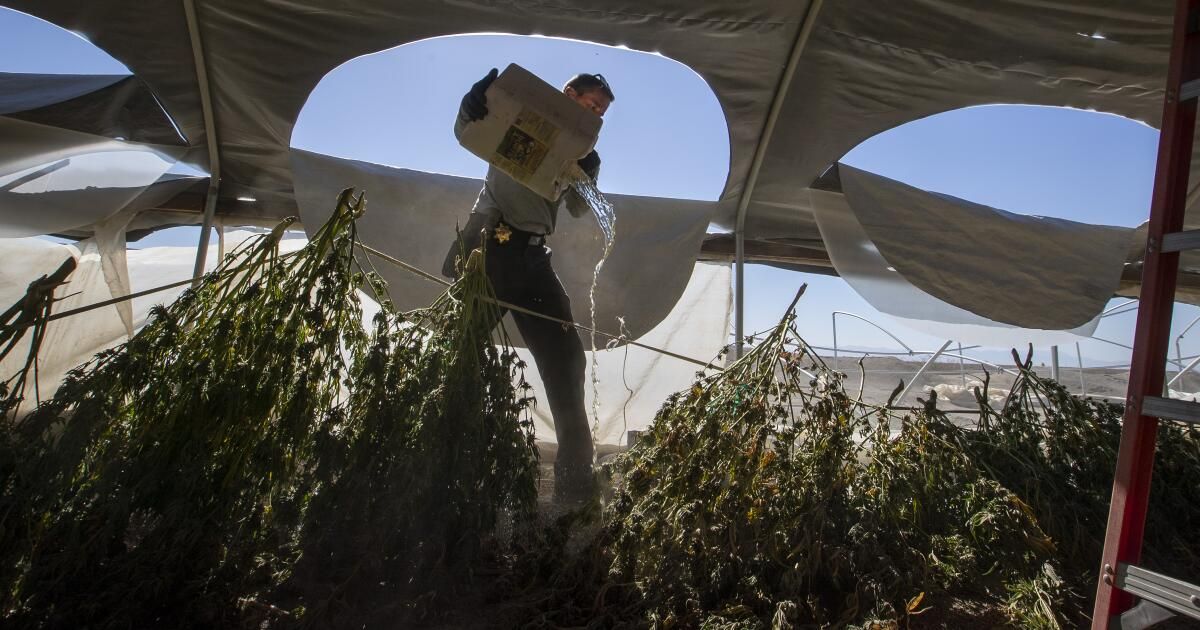Cannabis prohibition remains central to America's failed war on drugs: more than half a million people were arrested for a cannabis-related crime in the United States in 2018, representing more than 43% of all arrests. drug arrests.
But times are changing: cannabis reform is one of the most successful social movements in recent times. Today, 24 states and Washington, DC allow cannabis for adult use. Although the drug remains banned at the federal level, the Biden administration recently began the process of reclassifying cannabis as a less dangerous substance (moving from List I to List III). This will dramatically relax federal restrictions placed on the US cannabis industry, which is expected to generate more than $30 billion in retail sales in 2024.
However, legal cannabis has been something of a disappointment. High barriers to entry prevent many small business owners from entering the industry. A 2023 survey found that less than 25% of American cannabis companies are profitable and most of the money goes to a small group of large multi-state corporate operators led by predominantly white ownership groups. A 2021 report found that less than 2% of cannabis business owners in the United States are black.
These are the somewhat predictable results of the concessions that cannabis activists made to the business community. States that have not yet legalized cannabis should pay attention to the dangers of these compromises, or they will end up replicating the same power dynamics that legalization was supposed to alter.
Equity has always been a priority for some legal cannabis activists. Washington state legalized cannabis for adult use in 2012 with a law drafted by a small team of local activists and supported by the American Civil Liberties Union. Advocates were primarily concerned with protecting small independent operators, including protections such as residency requirements for cannabis license holders, limits on the number of licenses held, and strict limits on the amount of “canopy” a cultivator was allowed to cultivate. of cannabis. This has allowed small operators to gain a larger share of the market in Washington than in other states.
But when California legalized cannabis in 2016, corporations had realized the huge profit potential of legal marijuana. Local activists spent years drafting a progressive legalization initiative in California that included many of the same protections implemented in Washington. This effort was supported by prominent national cannabis advocacy groups, such as the Drug Policy Alliance and the Marijuana Policy Project. However, before they could qualify their amendment for the vote, Silicon Valley billionaire Sean Parker endorsed another legalization campaign with 8.5 million dollars of his own money. Some groups withdrew funds from the previous bill and pressured local activists to support the new, better-resourced campaign, leading to a more business-friendly bill with no residency requirements or licensing limits.
In other states, activists have attempted to develop consumer- and patient-centered legalization bills. Michigan's cannabis industry, for example, enjoys relatively low barriers to entry, making it easier for small operators to establish themselves, increasing competition and lowering costs for consumers. This occurred only because local activists resisted corporate influence. In the run-up to the 2018 Michigan campaign, national groups and corporate donors pressured them to draft a cannabis legalization bill favorable to companies seeking the same types of market advantages enjoyed in California. They rejected the pressure and as a result lost a considerable amount of financial support; On average, pro-legalization election campaigns outperform their opponents in more than 400%but in Michigan campaign spending was much closer. Voters still overwhelmingly supported the bill.
Still, Michigan has struggled with one of legalization's toughest challenges: racial equity. TO study 2021 found that about 3.8% of cannabis business owners in Michigan were black and only about 1.5% were Latino.
Some states have been experimenting with ways to address these concerns, with mixed results. In 2019, Illinois became the first state to incorporate specific racial equity provisions into its cannabis law, create a social equity application system, provide technical and financial assistance to first-time business owners, and distribute 25% of cannabis tax revenue to communities disproportionately affected by the war on drugs. TO recent report An estimated 27% of legal cannabis business owners in Illinois are Black, but only 5% identify as Latino and 3% as Asian.
New York's cannabis law, passed in 2021, followed in Illinois' footsteps and has been hailed as the more progressive The cannabis law is instituted, with the objective of granting at least fifty% of their cannabis licenses to share applicants. But so far it has proven difficult to fulfill that promise. After New York's cannabis market gained momentum this year, the initial results have been disappointing to equity advocates.
Still, these more progressive laws make it easier to achieve equity. Among the biggest barriers for people of color seeking to enter the industry are excessive regulations and fees, which tend to disproportionately affect small operators. Passing reforms has been a challenge because stakeholders who benefit from the current system fight hard to protect their share of the market, even when the regulations they protect make little practical sense.
And the reforms that make it face an uphill battle. In Washington, activists finally passed reforms designed to help equity applicants succeed in the cannabis industry in 2020, eight years after marijuana was legalized in that state. However, in recent years, the percentage of cannabis business owners in the state who are Black has plateaued at 4%.
It may be too late to prevent corporate dominance of the cannabis industry. The California market is already showing the effects of consolidation: The number of cannabis licenses in the state has fallen from a high of 18,000 to 4,000. While Californians once had around 6,000 cannabis brands to choose from, now only 1,600 are sold legally in the state. TO LA Times Analysis of 2022 found that the 10 companies with the largest cultivation operations in California own 22% of the state's cultivation licenses.
But the brewing industry suggests it is possible to secure more for small operators who are more like be people of color. Independently operated craft breweries have increased their market share, reaching the small but significant level of 13% in 2021.
If legal cannabis is not pushed in a more diverse and progressive direction, it will not achieve the social change that motivated many activists to pursue it in the first place.
Jose Mello is an associate professor of political science at DePaul University and the author of, most recently, “Pot for Profit: Cannabis Legalization, Racial Capitalism, and the Expansion of the Carceral State.”












